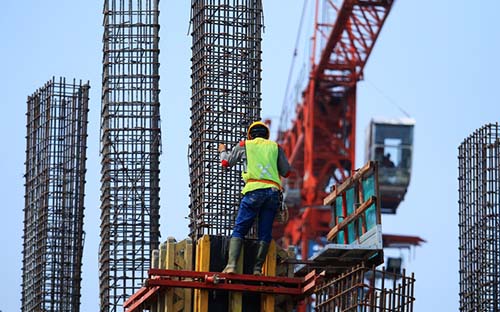 The Covid-19 crisis has precipitated a fundamental economic shake-up, very different to the global financial crisis (GFC) in 2008, observes Mark Rathbone, Asia Pacific capital projects and infrastructure leader at PwC. How is the pandemic affecting infrastructure investment?
Given the current global environment – from the coronavirus to an anticipated deep recession – where are you seeing investment opportunities and good value in infrastructure at present, both globally and in Asia, and how does the current investment environment compare to pre-Covid-19 levels?
The Covid-19 crisis has precipitated a fundamental economic shake-up, very different to the global financial crisis (GFC) in 2008, observes Mark Rathbone, Asia Pacific capital projects and infrastructure leader at PwC. How is the pandemic affecting infrastructure investment?
Given the current global environment – from the coronavirus to an anticipated deep recession – where are you seeing investment opportunities and good value in infrastructure at present, both globally and in Asia, and how does the current investment environment compare to pre-Covid-19 levels?Any core infrastructure asset that is dependent on demand/traffic and subject to market risk will be facing real challenges. Transport networks are under significant pressure as ridership drops; leisure or tourism infrastructure is under extreme pressure as there is little travel globally. Therefore one would expect portfolio owners with weaker balance sheets to be forced to sell their troubled assets. Conversely, digital infrastructure is at a premium as populations, organisations and governments have been forced to invest in technology solutions to allow remote working. We see five key trends in the future of infrastructure: o Innovation in financing will need to accelerate as government is forced to access private sector capital; o There will be a renewed focus on sustainability and resilience – continued investment across renewable energy, green infrastructure, but also a need to make our infrastructure more resilient to economic, health or climate shocks; o Technology adoption will accelerate further; o There will be increased infrastructure spend in the healthcare sector – supply chain and hospital capacity, both of which have been exposed as weak during this crisis; and o There is increased focus on investment in creating resilient logistics infrastructure, especially enablement of O2O (online-to-offline retail and commerce). What do you identify as the top three risks to infrastructure investments at present? o Reduction in revenue (revenue risk/market risk/tariff risk) is primary considering the drop-off in demand and the consequential impact on reduced revenues, reduced margins and the risk of default. o Risk of failure of supply chain leading to delayed construction programmes, and an inability to maintain assets due to lack of materials, equipment or components. o Risk of construction delay due to failure of supply chain and social distancing requirements is a fundamental issue – leading to requirements to renegotiate funding, seek contractual relief for delay penalties and, finally, commencement of operations and therefore revenues. All three of the above risks have the potential to cause project failure. The crisis is likely to lead to a rethink of concessions in the future as private-sector parties and lenders resist taking market/revenue risk. Governments will need to prioritise necessary infrastructure and focus immediate programmes on shovel-ready assets; and funders are likely to assess creditworthiness and project viability with more extreme downside scenarios. How are you applying ESG factors to infrastructure strategy and, in particular, to projects that are resource-intensive and heavy emitters of greenhouse gas emissions?
Environmental, social and governance (ESG) issues have become a very much more important set of principles that need to be addressed pre-financing and subsequently during the life of the project. Most investors and lenders now place the importance of the project’s ESG compliance with Sustainable Development Goals (SDGs)as a prerequisite to investment into any infrastructure asset. We are seeing a distinct shift from a simple compliance perspective of “do no harm”, to actively looking for value-creation opportunities with a “we can do better” mindset. EIAs [environmental impact assessments] are a crucial part of any due diligence programme for lenders or investors now – the impact of lending to or investing in infrastructure assets that do not comply with SDGs or accepted ESG principles have an immediate effect on shareholder value. Projects that are resource-intensive or heavy emitters are becoming increasingly difficult to finance as portfolio owners seek to create portfolios that are sustainable or decarbonise. Therefore, we are very focused on supporting our clients in navigating this complex issue, whether it is diversifying away from carbon-heavy industry into renewables; or seeking opportunity to drive sustainability; or ensuring projects comply with ESG principles. © 2020 funds global asia

 At times like these, HSBC Asset Management easily pivots towards emerging markets.
At times like these, HSBC Asset Management easily pivots towards emerging markets. A comprehensive, cost-effective, and transparent currency overlay hedging solution is crucial to mitigate FX exposure risks in the complex landscapes of Japan and China's FX markets, explains Hans Jacob Feder, PhD, global head of FX services at MUFG Investor Services.
A comprehensive, cost-effective, and transparent currency overlay hedging solution is crucial to mitigate FX exposure risks in the complex landscapes of Japan and China's FX markets, explains Hans Jacob Feder, PhD, global head of FX services at MUFG Investor Services. The world is transitioning from an era of commodity abundance to one of undersupply. Ben Ross and Tyler Rosenlicht of Cohen & Steers believe this shift may result in significant returns for commodities and resource producers over the next decade.
The world is transitioning from an era of commodity abundance to one of undersupply. Ben Ross and Tyler Rosenlicht of Cohen & Steers believe this shift may result in significant returns for commodities and resource producers over the next decade. Ross Dilkes, fixed income portfolio manager at Wellington Management, examines the opportunities and risks for bond investors presented by the region’s decarbonisation agenda.
Ross Dilkes, fixed income portfolio manager at Wellington Management, examines the opportunities and risks for bond investors presented by the region’s decarbonisation agenda. Shareholders in Japan no longer accept below-par corporate governance standards. Changes are taking place, but there are still areas for improvement, says Tetsuro Takase at SuMi Trust.
Shareholders in Japan no longer accept below-par corporate governance standards. Changes are taking place, but there are still areas for improvement, says Tetsuro Takase at SuMi Trust. Robert St Clair, head of investment strategy at Fullerton Fund Management, explores the reasons investors should be paying attention to the rising demand for healthcare in China.
Robert St Clair, head of investment strategy at Fullerton Fund Management, explores the reasons investors should be paying attention to the rising demand for healthcare in China.


